Organisational Behaviour: Culture, Politics, Power, and Motivation
VerifiedAdded on 2022/01/17
|17
|4871
|251
Report
AI Summary
This report analyzes organisational behaviour within the context of McDonald's, examining how culture, politics, and power influence individual and team performance. It explores various motivational theories, including Maslow's Hierarchy of Needs, Herzberg's Two-Factor Theory, McGregor's Theory X and Y, and Equity Theory, evaluating their application in influencing behaviour. The report also delves into the characteristics of effective and ineffective teams, referencing relevant team and group development theories. Furthermore, it critically analyzes the interplay between culture, politics, power, and motivation, offering recommendations for fostering team and organizational success. The report covers topics such as organizational culture, power dynamics, political influences, employee motivation, team development, and their impact on achieving organizational goals, providing a comprehensive overview of organisational behaviour principles and their practical application.
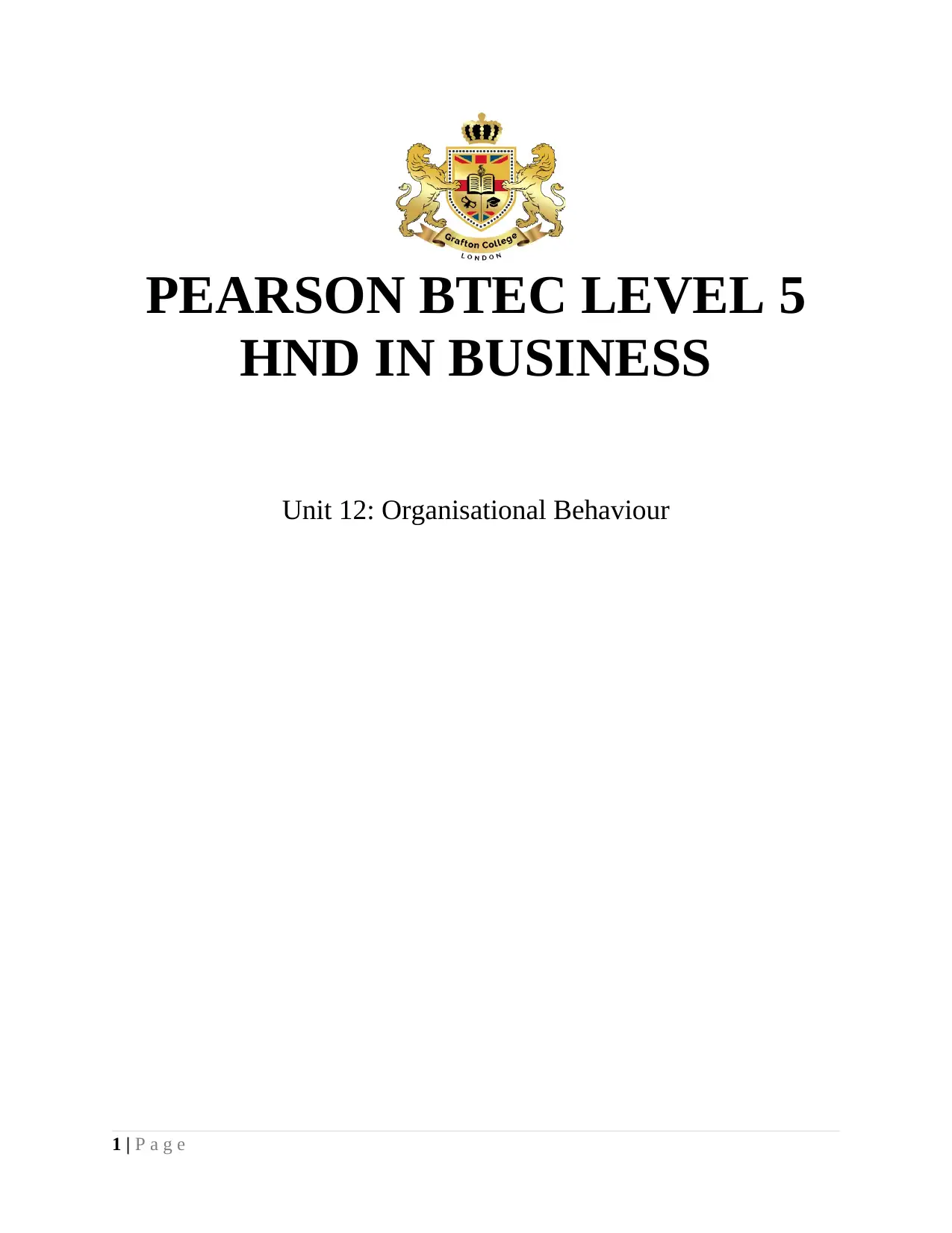
PEARSON BTEC LEVEL 5
HND IN BUSINESS
Unit 12: Organisational Behaviour
1 | P a g e
HND IN BUSINESS
Unit 12: Organisational Behaviour
1 | P a g e
Paraphrase This Document
Need a fresh take? Get an instant paraphrase of this document with our AI Paraphraser
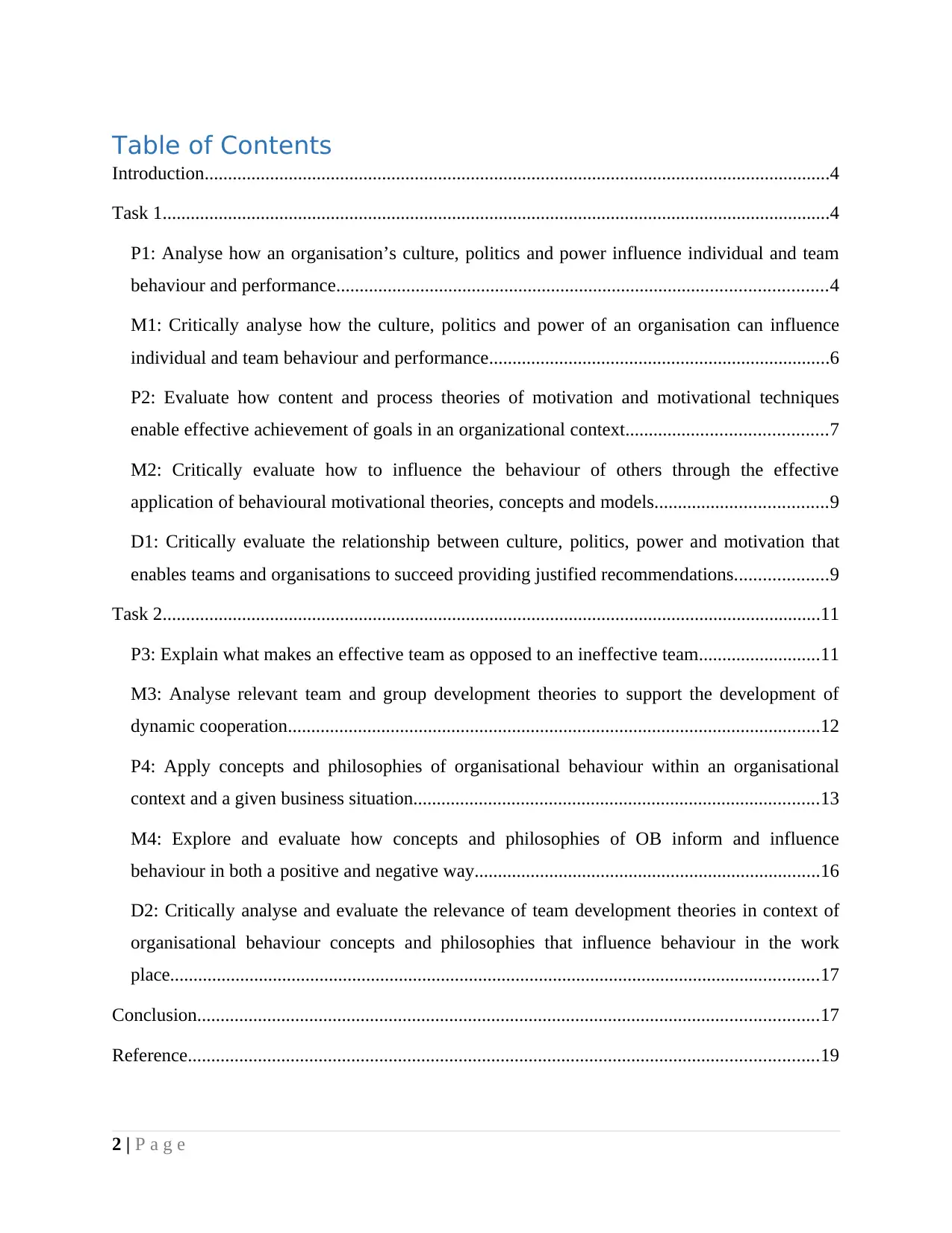
Table of Contents
Introduction......................................................................................................................................4
Task 1...............................................................................................................................................4
P1: Analyse how an organisation’s culture, politics and power influence individual and team
behaviour and performance.........................................................................................................4
M1: Critically analyse how the culture, politics and power of an organisation can influence
individual and team behaviour and performance.........................................................................6
P2: Evaluate how content and process theories of motivation and motivational techniques
enable effective achievement of goals in an organizational context...........................................7
M2: Critically evaluate how to influence the behaviour of others through the effective
application of behavioural motivational theories, concepts and models.....................................9
D1: Critically evaluate the relationship between culture, politics, power and motivation that
enables teams and organisations to succeed providing justified recommendations....................9
Task 2.............................................................................................................................................11
P3: Explain what makes an effective team as opposed to an ineffective team..........................11
M3: Analyse relevant team and group development theories to support the development of
dynamic cooperation..................................................................................................................12
P4: Apply concepts and philosophies of organisational behaviour within an organisational
context and a given business situation.......................................................................................13
M4: Explore and evaluate how concepts and philosophies of OB inform and influence
behaviour in both a positive and negative way..........................................................................16
D2: Critically analyse and evaluate the relevance of team development theories in context of
organisational behaviour concepts and philosophies that influence behaviour in the work
place...........................................................................................................................................17
Conclusion.....................................................................................................................................17
Reference.......................................................................................................................................19
2 | P a g e
Introduction......................................................................................................................................4
Task 1...............................................................................................................................................4
P1: Analyse how an organisation’s culture, politics and power influence individual and team
behaviour and performance.........................................................................................................4
M1: Critically analyse how the culture, politics and power of an organisation can influence
individual and team behaviour and performance.........................................................................6
P2: Evaluate how content and process theories of motivation and motivational techniques
enable effective achievement of goals in an organizational context...........................................7
M2: Critically evaluate how to influence the behaviour of others through the effective
application of behavioural motivational theories, concepts and models.....................................9
D1: Critically evaluate the relationship between culture, politics, power and motivation that
enables teams and organisations to succeed providing justified recommendations....................9
Task 2.............................................................................................................................................11
P3: Explain what makes an effective team as opposed to an ineffective team..........................11
M3: Analyse relevant team and group development theories to support the development of
dynamic cooperation..................................................................................................................12
P4: Apply concepts and philosophies of organisational behaviour within an organisational
context and a given business situation.......................................................................................13
M4: Explore and evaluate how concepts and philosophies of OB inform and influence
behaviour in both a positive and negative way..........................................................................16
D2: Critically analyse and evaluate the relevance of team development theories in context of
organisational behaviour concepts and philosophies that influence behaviour in the work
place...........................................................................................................................................17
Conclusion.....................................................................................................................................17
Reference.......................................................................................................................................19
2 | P a g e
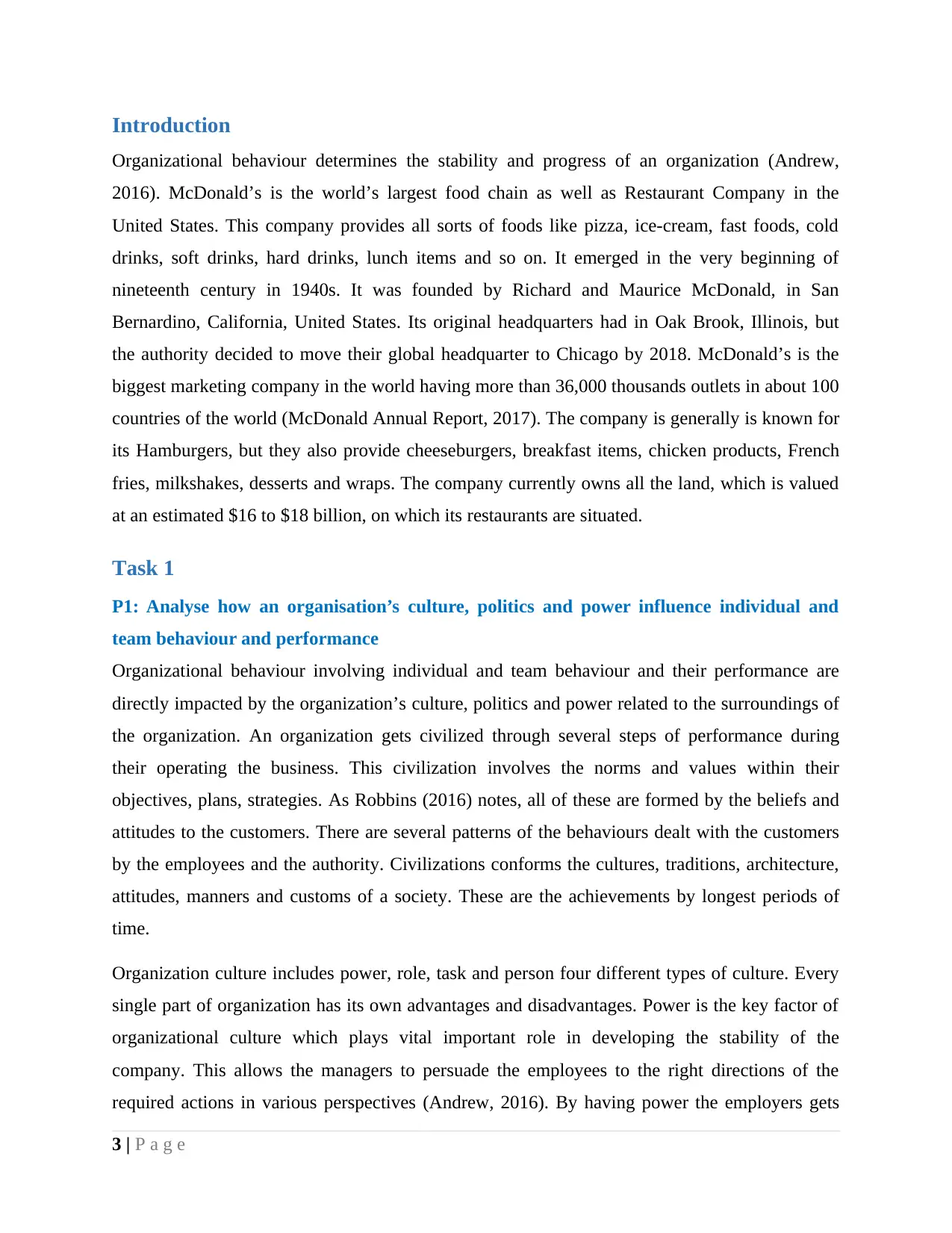
Introduction
Organizational behaviour determines the stability and progress of an organization (Andrew,
2016). McDonald’s is the world’s largest food chain as well as Restaurant Company in the
United States. This company provides all sorts of foods like pizza, ice-cream, fast foods, cold
drinks, soft drinks, hard drinks, lunch items and so on. It emerged in the very beginning of
nineteenth century in 1940s. It was founded by Richard and Maurice McDonald, in San
Bernardino, California, United States. Its original headquarters had in Oak Brook, Illinois, but
the authority decided to move their global headquarter to Chicago by 2018. McDonald’s is the
biggest marketing company in the world having more than 36,000 thousands outlets in about 100
countries of the world (McDonald Annual Report, 2017). The company is generally is known for
its Hamburgers, but they also provide cheeseburgers, breakfast items, chicken products, French
fries, milkshakes, desserts and wraps. The company currently owns all the land, which is valued
at an estimated $16 to $18 billion, on which its restaurants are situated.
Task 1
P1: Analyse how an organisation’s culture, politics and power influence individual and
team behaviour and performance
Organizational behaviour involving individual and team behaviour and their performance are
directly impacted by the organization’s culture, politics and power related to the surroundings of
the organization. An organization gets civilized through several steps of performance during
their operating the business. This civilization involves the norms and values within their
objectives, plans, strategies. As Robbins (2016) notes, all of these are formed by the beliefs and
attitudes to the customers. There are several patterns of the behaviours dealt with the customers
by the employees and the authority. Civilizations conforms the cultures, traditions, architecture,
attitudes, manners and customs of a society. These are the achievements by longest periods of
time.
Organization culture includes power, role, task and person four different types of culture. Every
single part of organization has its own advantages and disadvantages. Power is the key factor of
organizational culture which plays vital important role in developing the stability of the
company. This allows the managers to persuade the employees to the right directions of the
required actions in various perspectives (Andrew, 2016). By having power the employers gets
3 | P a g e
Organizational behaviour determines the stability and progress of an organization (Andrew,
2016). McDonald’s is the world’s largest food chain as well as Restaurant Company in the
United States. This company provides all sorts of foods like pizza, ice-cream, fast foods, cold
drinks, soft drinks, hard drinks, lunch items and so on. It emerged in the very beginning of
nineteenth century in 1940s. It was founded by Richard and Maurice McDonald, in San
Bernardino, California, United States. Its original headquarters had in Oak Brook, Illinois, but
the authority decided to move their global headquarter to Chicago by 2018. McDonald’s is the
biggest marketing company in the world having more than 36,000 thousands outlets in about 100
countries of the world (McDonald Annual Report, 2017). The company is generally is known for
its Hamburgers, but they also provide cheeseburgers, breakfast items, chicken products, French
fries, milkshakes, desserts and wraps. The company currently owns all the land, which is valued
at an estimated $16 to $18 billion, on which its restaurants are situated.
Task 1
P1: Analyse how an organisation’s culture, politics and power influence individual and
team behaviour and performance
Organizational behaviour involving individual and team behaviour and their performance are
directly impacted by the organization’s culture, politics and power related to the surroundings of
the organization. An organization gets civilized through several steps of performance during
their operating the business. This civilization involves the norms and values within their
objectives, plans, strategies. As Robbins (2016) notes, all of these are formed by the beliefs and
attitudes to the customers. There are several patterns of the behaviours dealt with the customers
by the employees and the authority. Civilizations conforms the cultures, traditions, architecture,
attitudes, manners and customs of a society. These are the achievements by longest periods of
time.
Organization culture includes power, role, task and person four different types of culture. Every
single part of organization has its own advantages and disadvantages. Power is the key factor of
organizational culture which plays vital important role in developing the stability of the
company. This allows the managers to persuade the employees to the right directions of the
required actions in various perspectives (Andrew, 2016). By having power the employers gets
3 | P a g e
⊘ This is a preview!⊘
Do you want full access?
Subscribe today to unlock all pages.

Trusted by 1+ million students worldwide
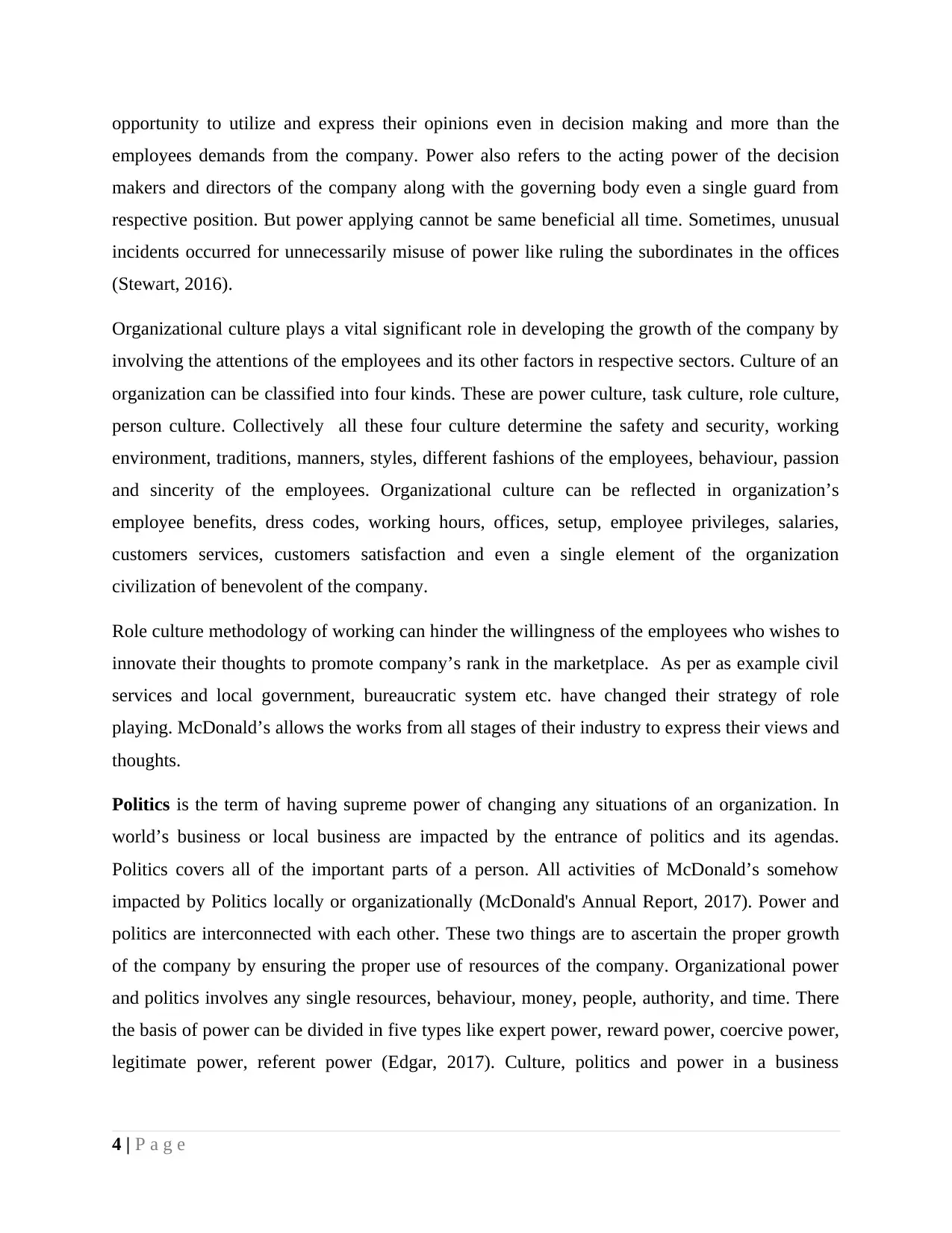
opportunity to utilize and express their opinions even in decision making and more than the
employees demands from the company. Power also refers to the acting power of the decision
makers and directors of the company along with the governing body even a single guard from
respective position. But power applying cannot be same beneficial all time. Sometimes, unusual
incidents occurred for unnecessarily misuse of power like ruling the subordinates in the offices
(Stewart, 2016).
Organizational culture plays a vital significant role in developing the growth of the company by
involving the attentions of the employees and its other factors in respective sectors. Culture of an
organization can be classified into four kinds. These are power culture, task culture, role culture,
person culture. Collectively all these four culture determine the safety and security, working
environment, traditions, manners, styles, different fashions of the employees, behaviour, passion
and sincerity of the employees. Organizational culture can be reflected in organization’s
employee benefits, dress codes, working hours, offices, setup, employee privileges, salaries,
customers services, customers satisfaction and even a single element of the organization
civilization of benevolent of the company.
Role culture methodology of working can hinder the willingness of the employees who wishes to
innovate their thoughts to promote company’s rank in the marketplace. As per as example civil
services and local government, bureaucratic system etc. have changed their strategy of role
playing. McDonald’s allows the works from all stages of their industry to express their views and
thoughts.
Politics is the term of having supreme power of changing any situations of an organization. In
world’s business or local business are impacted by the entrance of politics and its agendas.
Politics covers all of the important parts of a person. All activities of McDonald’s somehow
impacted by Politics locally or organizationally (McDonald's Annual Report, 2017). Power and
politics are interconnected with each other. These two things are to ascertain the proper growth
of the company by ensuring the proper use of resources of the company. Organizational power
and politics involves any single resources, behaviour, money, people, authority, and time. There
the basis of power can be divided in five types like expert power, reward power, coercive power,
legitimate power, referent power (Edgar, 2017). Culture, politics and power in a business
4 | P a g e
employees demands from the company. Power also refers to the acting power of the decision
makers and directors of the company along with the governing body even a single guard from
respective position. But power applying cannot be same beneficial all time. Sometimes, unusual
incidents occurred for unnecessarily misuse of power like ruling the subordinates in the offices
(Stewart, 2016).
Organizational culture plays a vital significant role in developing the growth of the company by
involving the attentions of the employees and its other factors in respective sectors. Culture of an
organization can be classified into four kinds. These are power culture, task culture, role culture,
person culture. Collectively all these four culture determine the safety and security, working
environment, traditions, manners, styles, different fashions of the employees, behaviour, passion
and sincerity of the employees. Organizational culture can be reflected in organization’s
employee benefits, dress codes, working hours, offices, setup, employee privileges, salaries,
customers services, customers satisfaction and even a single element of the organization
civilization of benevolent of the company.
Role culture methodology of working can hinder the willingness of the employees who wishes to
innovate their thoughts to promote company’s rank in the marketplace. As per as example civil
services and local government, bureaucratic system etc. have changed their strategy of role
playing. McDonald’s allows the works from all stages of their industry to express their views and
thoughts.
Politics is the term of having supreme power of changing any situations of an organization. In
world’s business or local business are impacted by the entrance of politics and its agendas.
Politics covers all of the important parts of a person. All activities of McDonald’s somehow
impacted by Politics locally or organizationally (McDonald's Annual Report, 2017). Power and
politics are interconnected with each other. These two things are to ascertain the proper growth
of the company by ensuring the proper use of resources of the company. Organizational power
and politics involves any single resources, behaviour, money, people, authority, and time. There
the basis of power can be divided in five types like expert power, reward power, coercive power,
legitimate power, referent power (Edgar, 2017). Culture, politics and power in a business
4 | P a g e
Paraphrase This Document
Need a fresh take? Get an instant paraphrase of this document with our AI Paraphraser
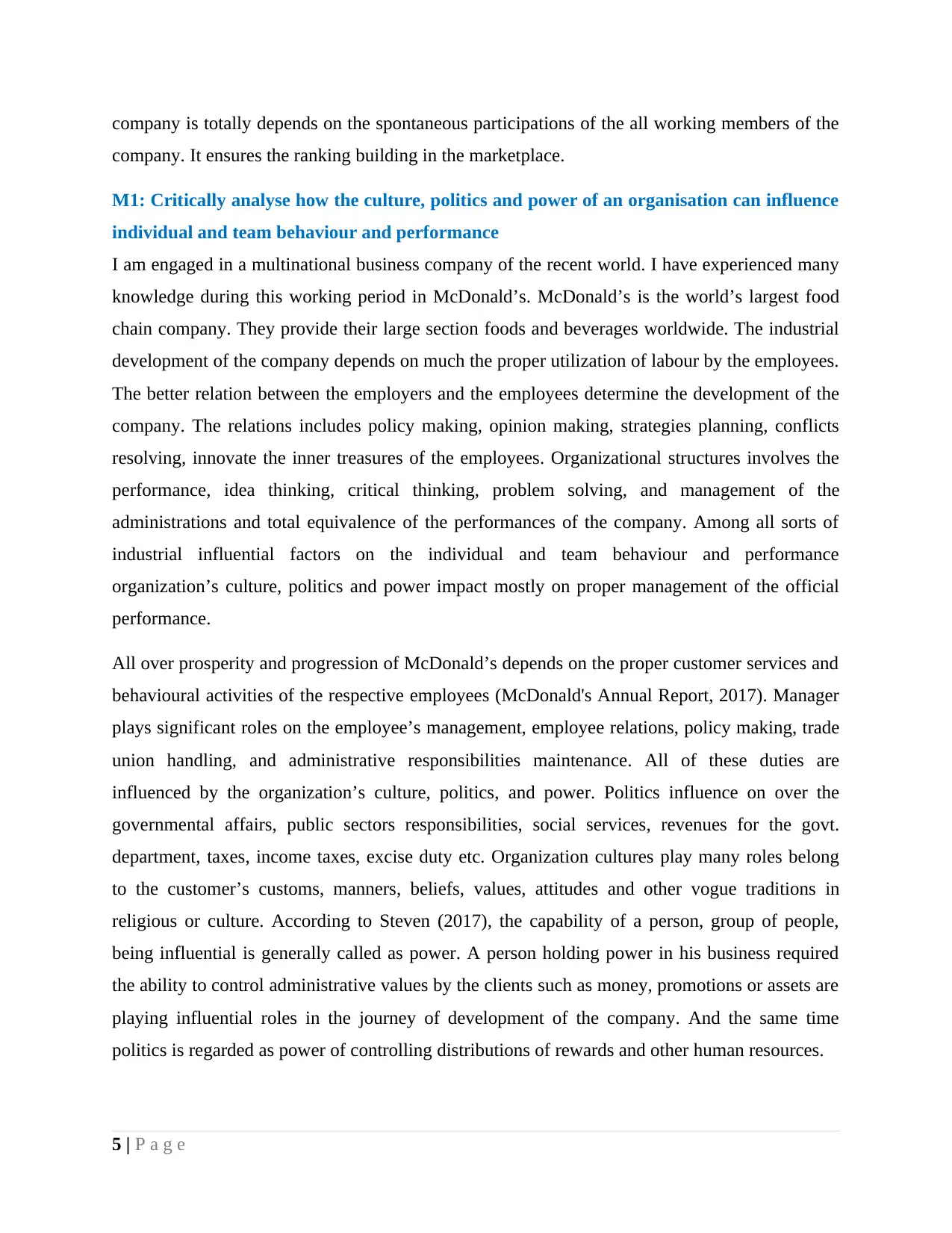
company is totally depends on the spontaneous participations of the all working members of the
company. It ensures the ranking building in the marketplace.
M1: Critically analyse how the culture, politics and power of an organisation can influence
individual and team behaviour and performance
I am engaged in a multinational business company of the recent world. I have experienced many
knowledge during this working period in McDonald’s. McDonald’s is the world’s largest food
chain company. They provide their large section foods and beverages worldwide. The industrial
development of the company depends on much the proper utilization of labour by the employees.
The better relation between the employers and the employees determine the development of the
company. The relations includes policy making, opinion making, strategies planning, conflicts
resolving, innovate the inner treasures of the employees. Organizational structures involves the
performance, idea thinking, critical thinking, problem solving, and management of the
administrations and total equivalence of the performances of the company. Among all sorts of
industrial influential factors on the individual and team behaviour and performance
organization’s culture, politics and power impact mostly on proper management of the official
performance.
All over prosperity and progression of McDonald’s depends on the proper customer services and
behavioural activities of the respective employees (McDonald's Annual Report, 2017). Manager
plays significant roles on the employee’s management, employee relations, policy making, trade
union handling, and administrative responsibilities maintenance. All of these duties are
influenced by the organization’s culture, politics, and power. Politics influence on over the
governmental affairs, public sectors responsibilities, social services, revenues for the govt.
department, taxes, income taxes, excise duty etc. Organization cultures play many roles belong
to the customer’s customs, manners, beliefs, values, attitudes and other vogue traditions in
religious or culture. According to Steven (2017), the capability of a person, group of people,
being influential is generally called as power. A person holding power in his business required
the ability to control administrative values by the clients such as money, promotions or assets are
playing influential roles in the journey of development of the company. And the same time
politics is regarded as power of controlling distributions of rewards and other human resources.
5 | P a g e
company. It ensures the ranking building in the marketplace.
M1: Critically analyse how the culture, politics and power of an organisation can influence
individual and team behaviour and performance
I am engaged in a multinational business company of the recent world. I have experienced many
knowledge during this working period in McDonald’s. McDonald’s is the world’s largest food
chain company. They provide their large section foods and beverages worldwide. The industrial
development of the company depends on much the proper utilization of labour by the employees.
The better relation between the employers and the employees determine the development of the
company. The relations includes policy making, opinion making, strategies planning, conflicts
resolving, innovate the inner treasures of the employees. Organizational structures involves the
performance, idea thinking, critical thinking, problem solving, and management of the
administrations and total equivalence of the performances of the company. Among all sorts of
industrial influential factors on the individual and team behaviour and performance
organization’s culture, politics and power impact mostly on proper management of the official
performance.
All over prosperity and progression of McDonald’s depends on the proper customer services and
behavioural activities of the respective employees (McDonald's Annual Report, 2017). Manager
plays significant roles on the employee’s management, employee relations, policy making, trade
union handling, and administrative responsibilities maintenance. All of these duties are
influenced by the organization’s culture, politics, and power. Politics influence on over the
governmental affairs, public sectors responsibilities, social services, revenues for the govt.
department, taxes, income taxes, excise duty etc. Organization cultures play many roles belong
to the customer’s customs, manners, beliefs, values, attitudes and other vogue traditions in
religious or culture. According to Steven (2017), the capability of a person, group of people,
being influential is generally called as power. A person holding power in his business required
the ability to control administrative values by the clients such as money, promotions or assets are
playing influential roles in the journey of development of the company. And the same time
politics is regarded as power of controlling distributions of rewards and other human resources.
5 | P a g e
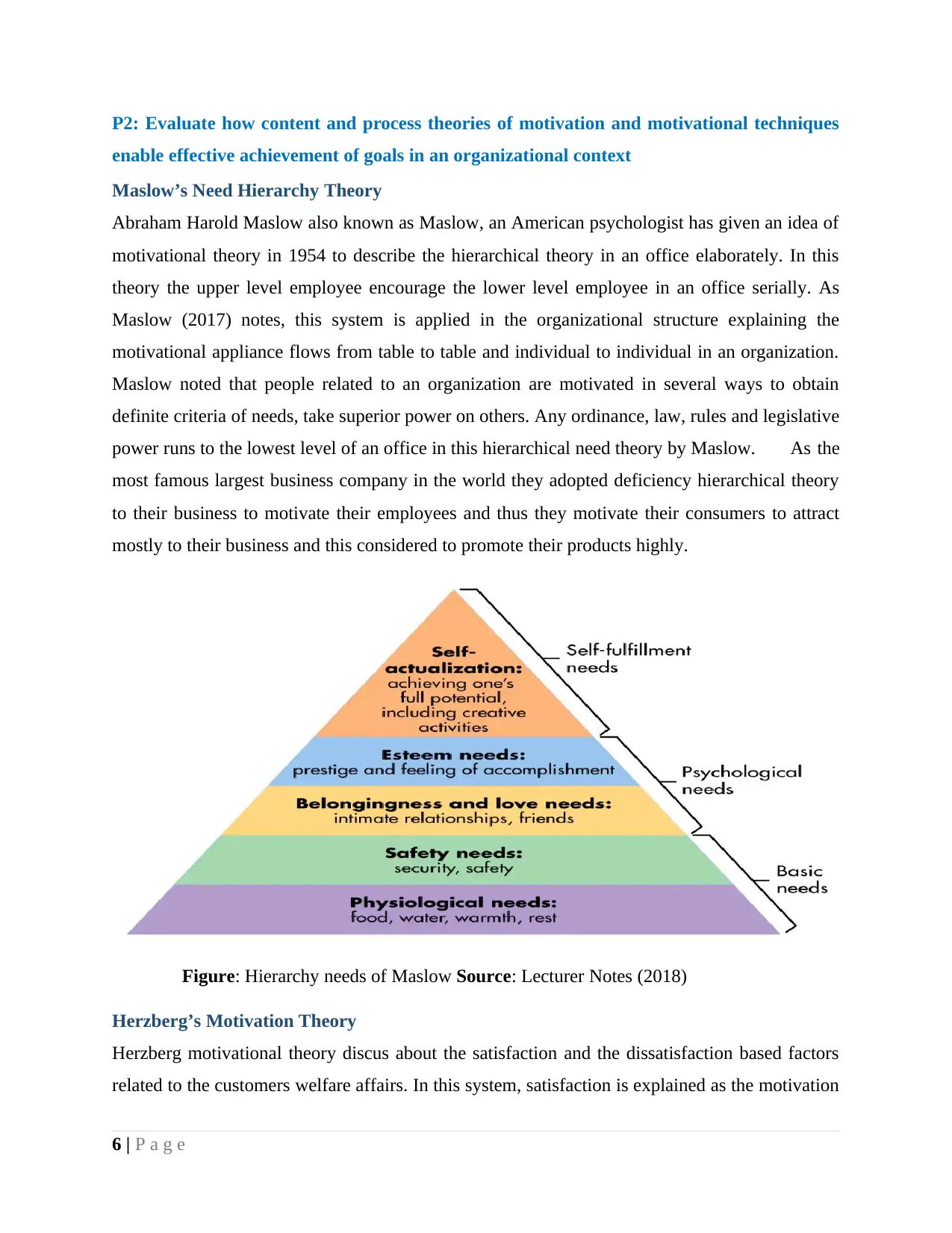
P2: Evaluate how content and process theories of motivation and motivational techniques
enable effective achievement of goals in an organizational context
Maslow’s Need Hierarchy Theory
Abraham Harold Maslow also known as Maslow, an American psychologist has given an idea of
motivational theory in 1954 to describe the hierarchical theory in an office elaborately. In this
theory the upper level employee encourage the lower level employee in an office serially. As
Maslow (2017) notes, this system is applied in the organizational structure explaining the
motivational appliance flows from table to table and individual to individual in an organization.
Maslow noted that people related to an organization are motivated in several ways to obtain
definite criteria of needs, take superior power on others. Any ordinance, law, rules and legislative
power runs to the lowest level of an office in this hierarchical need theory by Maslow. As the
most famous largest business company in the world they adopted deficiency hierarchical theory
to their business to motivate their employees and thus they motivate their consumers to attract
mostly to their business and this considered to promote their products highly.
Figure: Hierarchy needs of Maslow Source: Lecturer Notes (2018)
Herzberg’s Motivation Theory
Herzberg motivational theory discus about the satisfaction and the dissatisfaction based factors
related to the customers welfare affairs. In this system, satisfaction is explained as the motivation
6 | P a g e
enable effective achievement of goals in an organizational context
Maslow’s Need Hierarchy Theory
Abraham Harold Maslow also known as Maslow, an American psychologist has given an idea of
motivational theory in 1954 to describe the hierarchical theory in an office elaborately. In this
theory the upper level employee encourage the lower level employee in an office serially. As
Maslow (2017) notes, this system is applied in the organizational structure explaining the
motivational appliance flows from table to table and individual to individual in an organization.
Maslow noted that people related to an organization are motivated in several ways to obtain
definite criteria of needs, take superior power on others. Any ordinance, law, rules and legislative
power runs to the lowest level of an office in this hierarchical need theory by Maslow. As the
most famous largest business company in the world they adopted deficiency hierarchical theory
to their business to motivate their employees and thus they motivate their consumers to attract
mostly to their business and this considered to promote their products highly.
Figure: Hierarchy needs of Maslow Source: Lecturer Notes (2018)
Herzberg’s Motivation Theory
Herzberg motivational theory discus about the satisfaction and the dissatisfaction based factors
related to the customers welfare affairs. In this system, satisfaction is explained as the motivation
6 | P a g e
⊘ This is a preview!⊘
Do you want full access?
Subscribe today to unlock all pages.

Trusted by 1+ million students worldwide
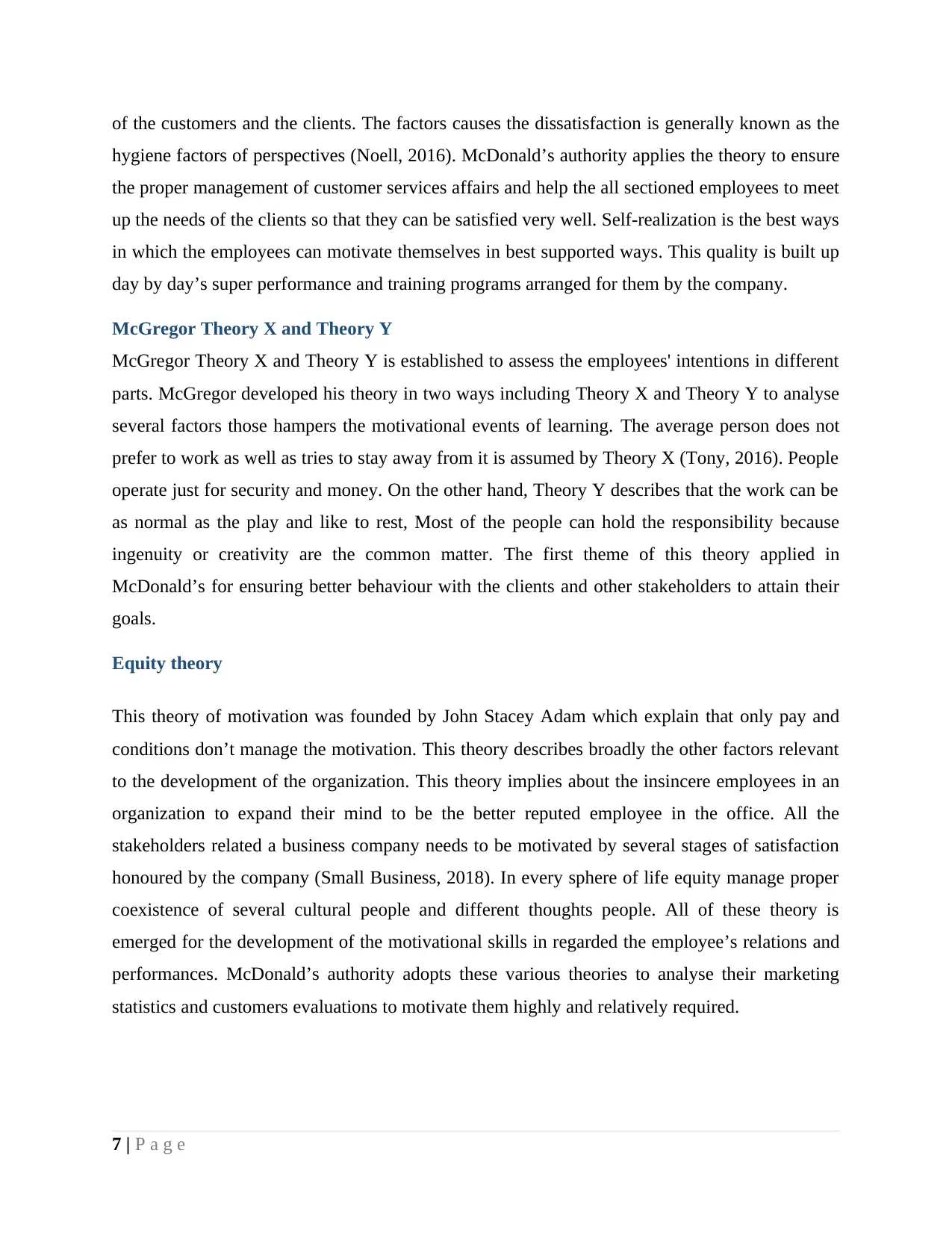
of the customers and the clients. The factors causes the dissatisfaction is generally known as the
hygiene factors of perspectives (Noell, 2016). McDonald’s authority applies the theory to ensure
the proper management of customer services affairs and help the all sectioned employees to meet
up the needs of the clients so that they can be satisfied very well. Self-realization is the best ways
in which the employees can motivate themselves in best supported ways. This quality is built up
day by day’s super performance and training programs arranged for them by the company.
McGregor Theory X and Theory Y
McGregor Theory X and Theory Y is established to assess the employees' intentions in different
parts. McGregor developed his theory in two ways including Theory X and Theory Y to analyse
several factors those hampers the motivational events of learning. The average person does not
prefer to work as well as tries to stay away from it is assumed by Theory X (Tony, 2016). People
operate just for security and money. On the other hand, Theory Y describes that the work can be
as normal as the play and like to rest, Most of the people can hold the responsibility because
ingenuity or creativity are the common matter. The first theme of this theory applied in
McDonald’s for ensuring better behaviour with the clients and other stakeholders to attain their
goals.
Equity theory
This theory of motivation was founded by John Stacey Adam which explain that only pay and
conditions don’t manage the motivation. This theory describes broadly the other factors relevant
to the development of the organization. This theory implies about the insincere employees in an
organization to expand their mind to be the better reputed employee in the office. All the
stakeholders related a business company needs to be motivated by several stages of satisfaction
honoured by the company (Small Business, 2018). In every sphere of life equity manage proper
coexistence of several cultural people and different thoughts people. All of these theory is
emerged for the development of the motivational skills in regarded the employee’s relations and
performances. McDonald’s authority adopts these various theories to analyse their marketing
statistics and customers evaluations to motivate them highly and relatively required.
7 | P a g e
hygiene factors of perspectives (Noell, 2016). McDonald’s authority applies the theory to ensure
the proper management of customer services affairs and help the all sectioned employees to meet
up the needs of the clients so that they can be satisfied very well. Self-realization is the best ways
in which the employees can motivate themselves in best supported ways. This quality is built up
day by day’s super performance and training programs arranged for them by the company.
McGregor Theory X and Theory Y
McGregor Theory X and Theory Y is established to assess the employees' intentions in different
parts. McGregor developed his theory in two ways including Theory X and Theory Y to analyse
several factors those hampers the motivational events of learning. The average person does not
prefer to work as well as tries to stay away from it is assumed by Theory X (Tony, 2016). People
operate just for security and money. On the other hand, Theory Y describes that the work can be
as normal as the play and like to rest, Most of the people can hold the responsibility because
ingenuity or creativity are the common matter. The first theme of this theory applied in
McDonald’s for ensuring better behaviour with the clients and other stakeholders to attain their
goals.
Equity theory
This theory of motivation was founded by John Stacey Adam which explain that only pay and
conditions don’t manage the motivation. This theory describes broadly the other factors relevant
to the development of the organization. This theory implies about the insincere employees in an
organization to expand their mind to be the better reputed employee in the office. All the
stakeholders related a business company needs to be motivated by several stages of satisfaction
honoured by the company (Small Business, 2018). In every sphere of life equity manage proper
coexistence of several cultural people and different thoughts people. All of these theory is
emerged for the development of the motivational skills in regarded the employee’s relations and
performances. McDonald’s authority adopts these various theories to analyse their marketing
statistics and customers evaluations to motivate them highly and relatively required.
7 | P a g e
Paraphrase This Document
Need a fresh take? Get an instant paraphrase of this document with our AI Paraphraser
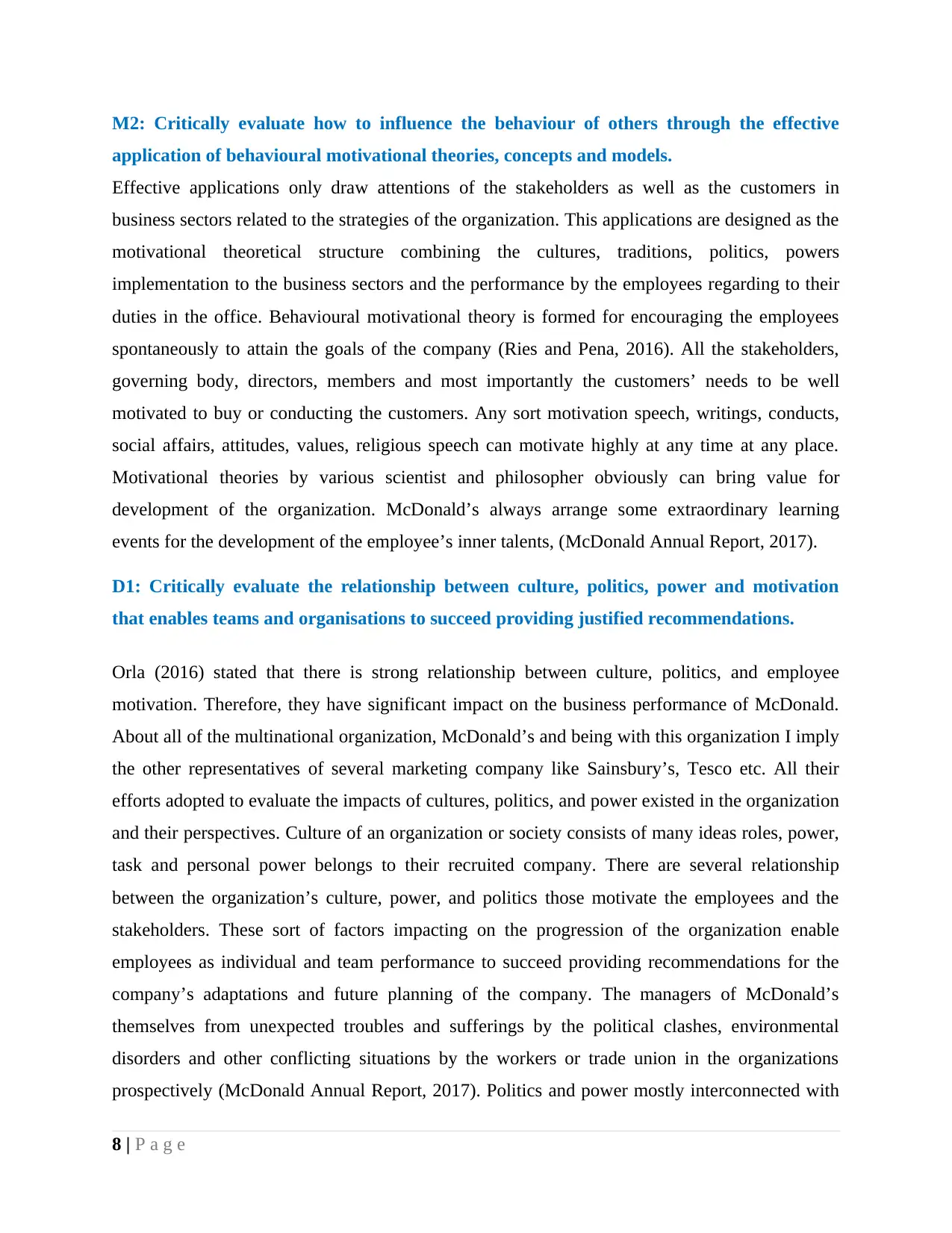
M2: Critically evaluate how to influence the behaviour of others through the effective
application of behavioural motivational theories, concepts and models.
Effective applications only draw attentions of the stakeholders as well as the customers in
business sectors related to the strategies of the organization. This applications are designed as the
motivational theoretical structure combining the cultures, traditions, politics, powers
implementation to the business sectors and the performance by the employees regarding to their
duties in the office. Behavioural motivational theory is formed for encouraging the employees
spontaneously to attain the goals of the company (Ries and Pena, 2016). All the stakeholders,
governing body, directors, members and most importantly the customers’ needs to be well
motivated to buy or conducting the customers. Any sort motivation speech, writings, conducts,
social affairs, attitudes, values, religious speech can motivate highly at any time at any place.
Motivational theories by various scientist and philosopher obviously can bring value for
development of the organization. McDonald’s always arrange some extraordinary learning
events for the development of the employee’s inner talents, (McDonald Annual Report, 2017).
D1: Critically evaluate the relationship between culture, politics, power and motivation
that enables teams and organisations to succeed providing justified recommendations.
Orla (2016) stated that there is strong relationship between culture, politics, and employee
motivation. Therefore, they have significant impact on the business performance of McDonald.
About all of the multinational organization, McDonald’s and being with this organization I imply
the other representatives of several marketing company like Sainsbury’s, Tesco etc. All their
efforts adopted to evaluate the impacts of cultures, politics, and power existed in the organization
and their perspectives. Culture of an organization or society consists of many ideas roles, power,
task and personal power belongs to their recruited company. There are several relationship
between the organization’s culture, power, and politics those motivate the employees and the
stakeholders. These sort of factors impacting on the progression of the organization enable
employees as individual and team performance to succeed providing recommendations for the
company’s adaptations and future planning of the company. The managers of McDonald’s
themselves from unexpected troubles and sufferings by the political clashes, environmental
disorders and other conflicting situations by the workers or trade union in the organizations
prospectively (McDonald Annual Report, 2017). Politics and power mostly interconnected with
8 | P a g e
application of behavioural motivational theories, concepts and models.
Effective applications only draw attentions of the stakeholders as well as the customers in
business sectors related to the strategies of the organization. This applications are designed as the
motivational theoretical structure combining the cultures, traditions, politics, powers
implementation to the business sectors and the performance by the employees regarding to their
duties in the office. Behavioural motivational theory is formed for encouraging the employees
spontaneously to attain the goals of the company (Ries and Pena, 2016). All the stakeholders,
governing body, directors, members and most importantly the customers’ needs to be well
motivated to buy or conducting the customers. Any sort motivation speech, writings, conducts,
social affairs, attitudes, values, religious speech can motivate highly at any time at any place.
Motivational theories by various scientist and philosopher obviously can bring value for
development of the organization. McDonald’s always arrange some extraordinary learning
events for the development of the employee’s inner talents, (McDonald Annual Report, 2017).
D1: Critically evaluate the relationship between culture, politics, power and motivation
that enables teams and organisations to succeed providing justified recommendations.
Orla (2016) stated that there is strong relationship between culture, politics, and employee
motivation. Therefore, they have significant impact on the business performance of McDonald.
About all of the multinational organization, McDonald’s and being with this organization I imply
the other representatives of several marketing company like Sainsbury’s, Tesco etc. All their
efforts adopted to evaluate the impacts of cultures, politics, and power existed in the organization
and their perspectives. Culture of an organization or society consists of many ideas roles, power,
task and personal power belongs to their recruited company. There are several relationship
between the organization’s culture, power, and politics those motivate the employees and the
stakeholders. These sort of factors impacting on the progression of the organization enable
employees as individual and team performance to succeed providing recommendations for the
company’s adaptations and future planning of the company. The managers of McDonald’s
themselves from unexpected troubles and sufferings by the political clashes, environmental
disorders and other conflicting situations by the workers or trade union in the organizations
prospectively (McDonald Annual Report, 2017). Politics and power mostly interconnected with
8 | P a g e
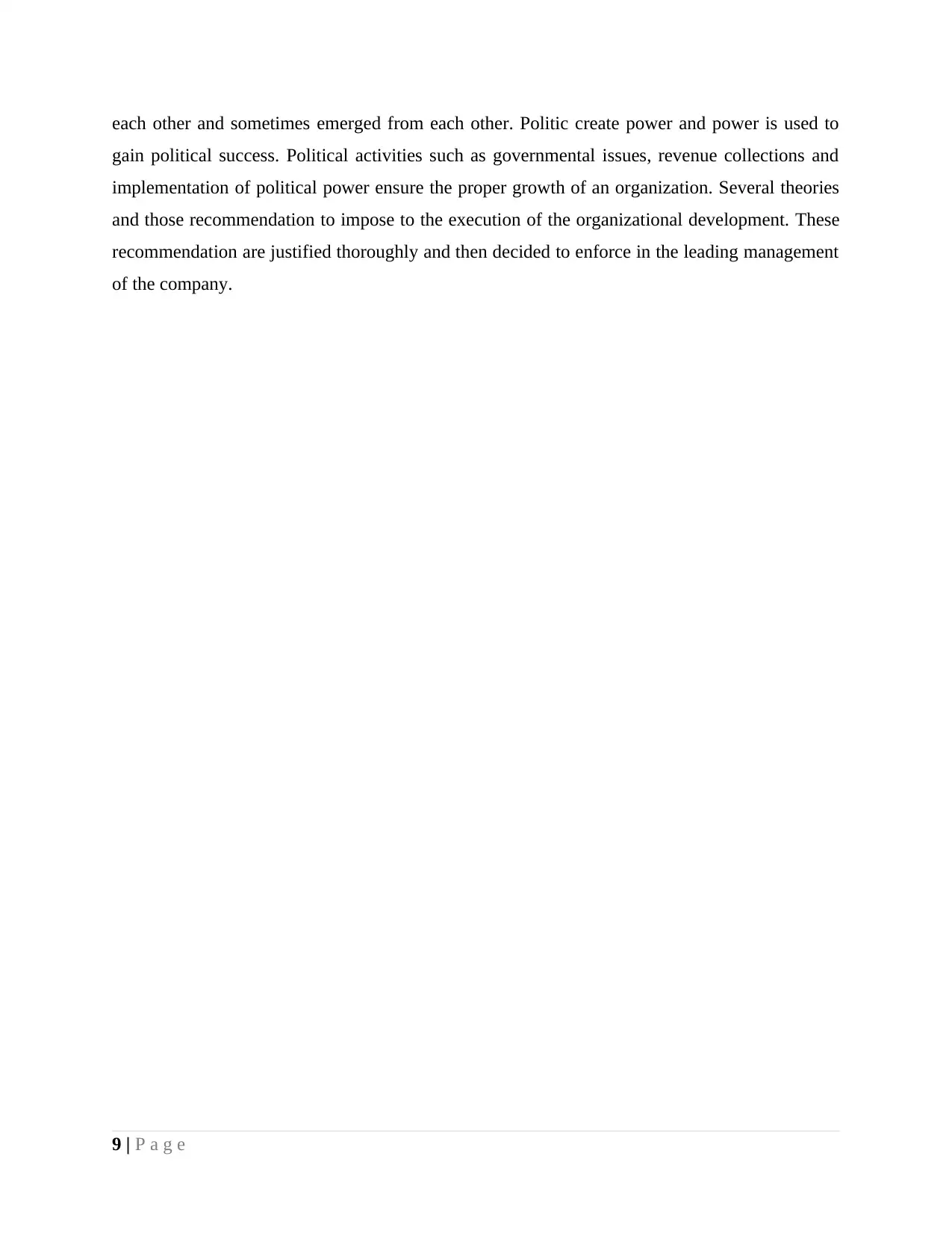
each other and sometimes emerged from each other. Politic create power and power is used to
gain political success. Political activities such as governmental issues, revenue collections and
implementation of political power ensure the proper growth of an organization. Several theories
and those recommendation to impose to the execution of the organizational development. These
recommendation are justified thoroughly and then decided to enforce in the leading management
of the company.
9 | P a g e
gain political success. Political activities such as governmental issues, revenue collections and
implementation of political power ensure the proper growth of an organization. Several theories
and those recommendation to impose to the execution of the organizational development. These
recommendation are justified thoroughly and then decided to enforce in the leading management
of the company.
9 | P a g e
⊘ This is a preview!⊘
Do you want full access?
Subscribe today to unlock all pages.

Trusted by 1+ million students worldwide
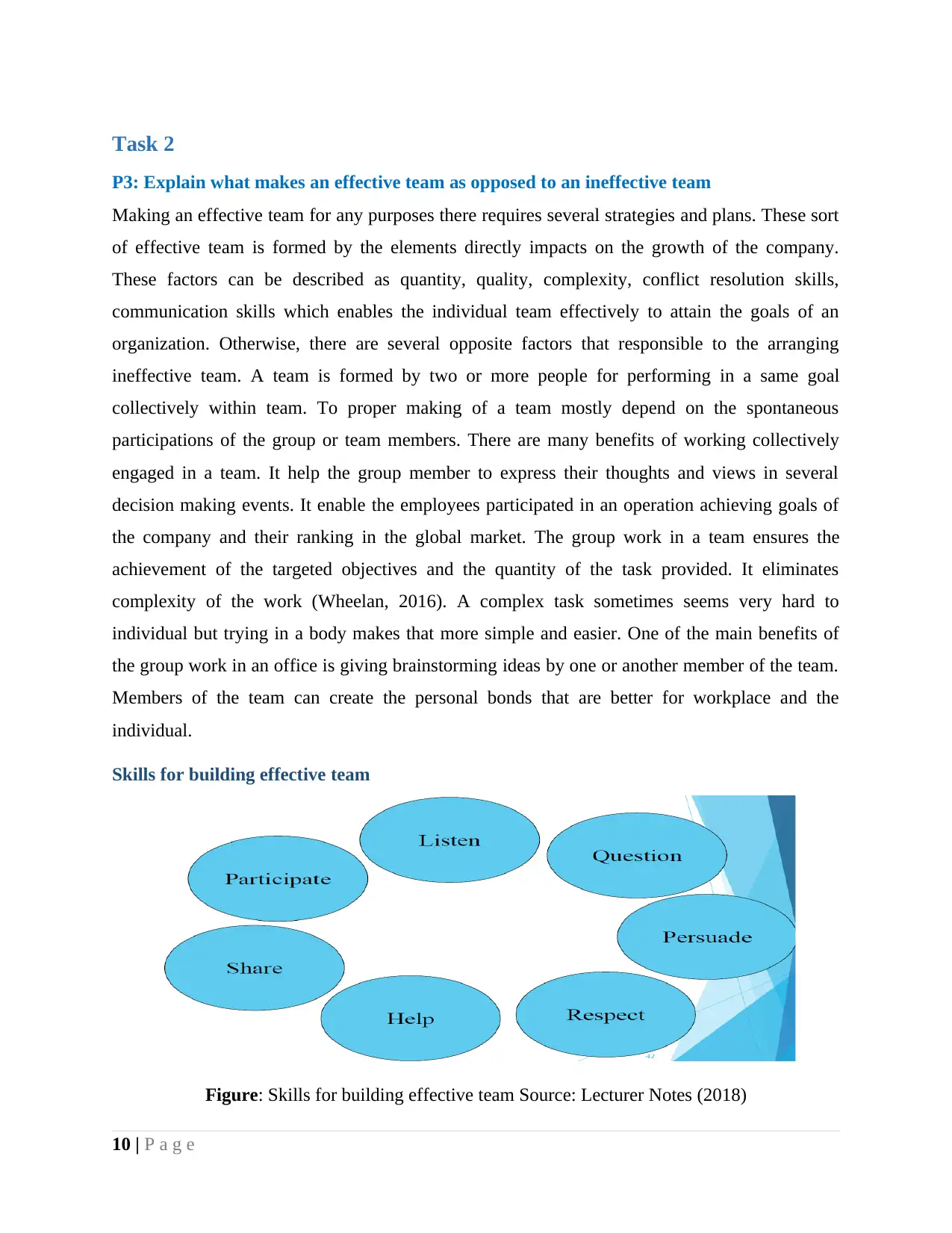
Task 2
P3: Explain what makes an effective team as opposed to an ineffective team
Making an effective team for any purposes there requires several strategies and plans. These sort
of effective team is formed by the elements directly impacts on the growth of the company.
These factors can be described as quantity, quality, complexity, conflict resolution skills,
communication skills which enables the individual team effectively to attain the goals of an
organization. Otherwise, there are several opposite factors that responsible to the arranging
ineffective team. A team is formed by two or more people for performing in a same goal
collectively within team. To proper making of a team mostly depend on the spontaneous
participations of the group or team members. There are many benefits of working collectively
engaged in a team. It help the group member to express their thoughts and views in several
decision making events. It enable the employees participated in an operation achieving goals of
the company and their ranking in the global market. The group work in a team ensures the
achievement of the targeted objectives and the quantity of the task provided. It eliminates
complexity of the work (Wheelan, 2016). A complex task sometimes seems very hard to
individual but trying in a body makes that more simple and easier. One of the main benefits of
the group work in an office is giving brainstorming ideas by one or another member of the team.
Members of the team can create the personal bonds that are better for workplace and the
individual.
Skills for building effective team
Figure: Skills for building effective team Source: Lecturer Notes (2018)
10 | P a g e
P3: Explain what makes an effective team as opposed to an ineffective team
Making an effective team for any purposes there requires several strategies and plans. These sort
of effective team is formed by the elements directly impacts on the growth of the company.
These factors can be described as quantity, quality, complexity, conflict resolution skills,
communication skills which enables the individual team effectively to attain the goals of an
organization. Otherwise, there are several opposite factors that responsible to the arranging
ineffective team. A team is formed by two or more people for performing in a same goal
collectively within team. To proper making of a team mostly depend on the spontaneous
participations of the group or team members. There are many benefits of working collectively
engaged in a team. It help the group member to express their thoughts and views in several
decision making events. It enable the employees participated in an operation achieving goals of
the company and their ranking in the global market. The group work in a team ensures the
achievement of the targeted objectives and the quantity of the task provided. It eliminates
complexity of the work (Wheelan, 2016). A complex task sometimes seems very hard to
individual but trying in a body makes that more simple and easier. One of the main benefits of
the group work in an office is giving brainstorming ideas by one or another member of the team.
Members of the team can create the personal bonds that are better for workplace and the
individual.
Skills for building effective team
Figure: Skills for building effective team Source: Lecturer Notes (2018)
10 | P a g e
Paraphrase This Document
Need a fresh take? Get an instant paraphrase of this document with our AI Paraphraser
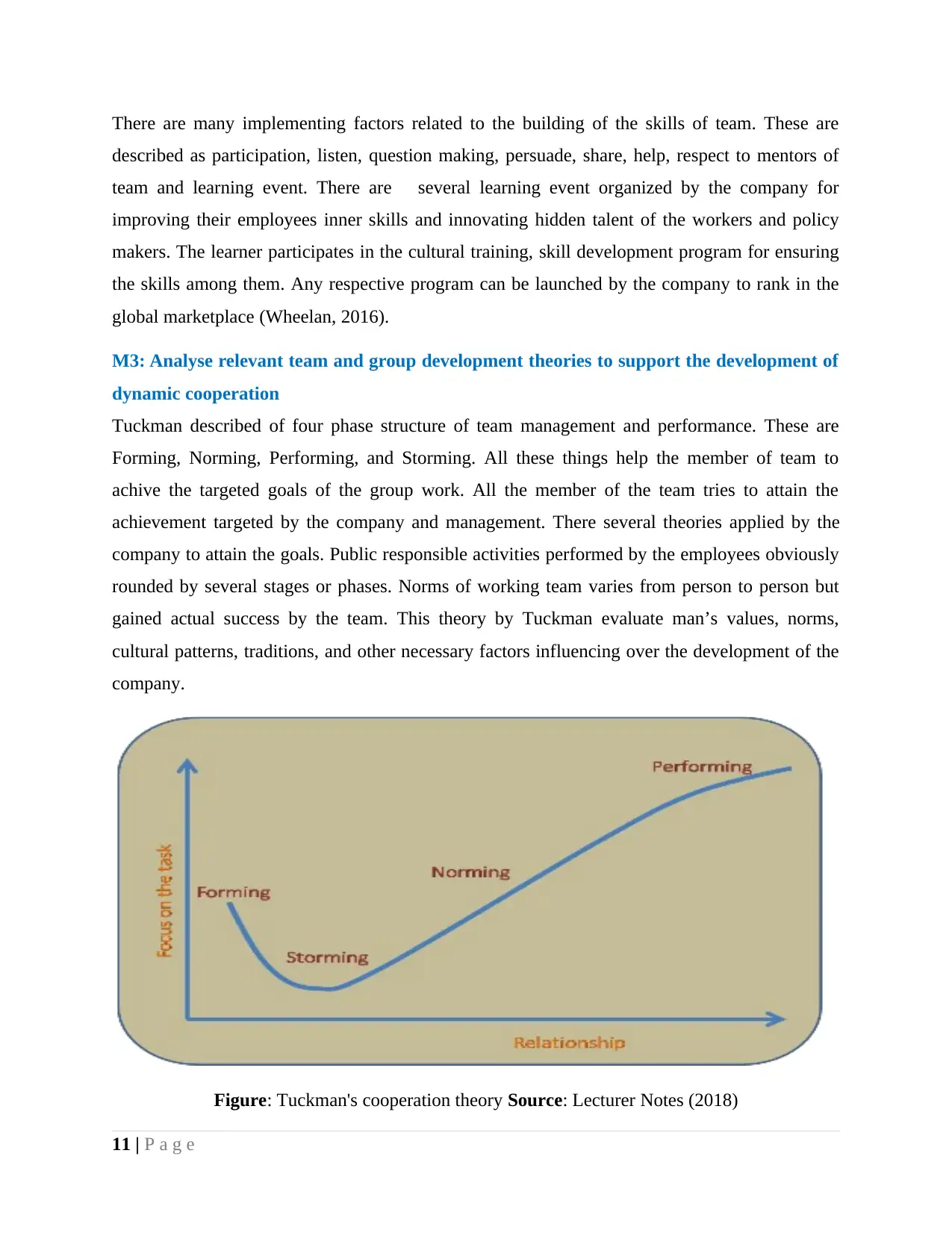
There are many implementing factors related to the building of the skills of team. These are
described as participation, listen, question making, persuade, share, help, respect to mentors of
team and learning event. There are several learning event organized by the company for
improving their employees inner skills and innovating hidden talent of the workers and policy
makers. The learner participates in the cultural training, skill development program for ensuring
the skills among them. Any respective program can be launched by the company to rank in the
global marketplace (Wheelan, 2016).
M3: Analyse relevant team and group development theories to support the development of
dynamic cooperation
Tuckman described of four phase structure of team management and performance. These are
Forming, Norming, Performing, and Storming. All these things help the member of team to
achive the targeted goals of the group work. All the member of the team tries to attain the
achievement targeted by the company and management. There several theories applied by the
company to attain the goals. Public responsible activities performed by the employees obviously
rounded by several stages or phases. Norms of working team varies from person to person but
gained actual success by the team. This theory by Tuckman evaluate man’s values, norms,
cultural patterns, traditions, and other necessary factors influencing over the development of the
company.
Figure: Tuckman's cooperation theory Source: Lecturer Notes (2018)
11 | P a g e
described as participation, listen, question making, persuade, share, help, respect to mentors of
team and learning event. There are several learning event organized by the company for
improving their employees inner skills and innovating hidden talent of the workers and policy
makers. The learner participates in the cultural training, skill development program for ensuring
the skills among them. Any respective program can be launched by the company to rank in the
global marketplace (Wheelan, 2016).
M3: Analyse relevant team and group development theories to support the development of
dynamic cooperation
Tuckman described of four phase structure of team management and performance. These are
Forming, Norming, Performing, and Storming. All these things help the member of team to
achive the targeted goals of the group work. All the member of the team tries to attain the
achievement targeted by the company and management. There several theories applied by the
company to attain the goals. Public responsible activities performed by the employees obviously
rounded by several stages or phases. Norms of working team varies from person to person but
gained actual success by the team. This theory by Tuckman evaluate man’s values, norms,
cultural patterns, traditions, and other necessary factors influencing over the development of the
company.
Figure: Tuckman's cooperation theory Source: Lecturer Notes (2018)
11 | P a g e
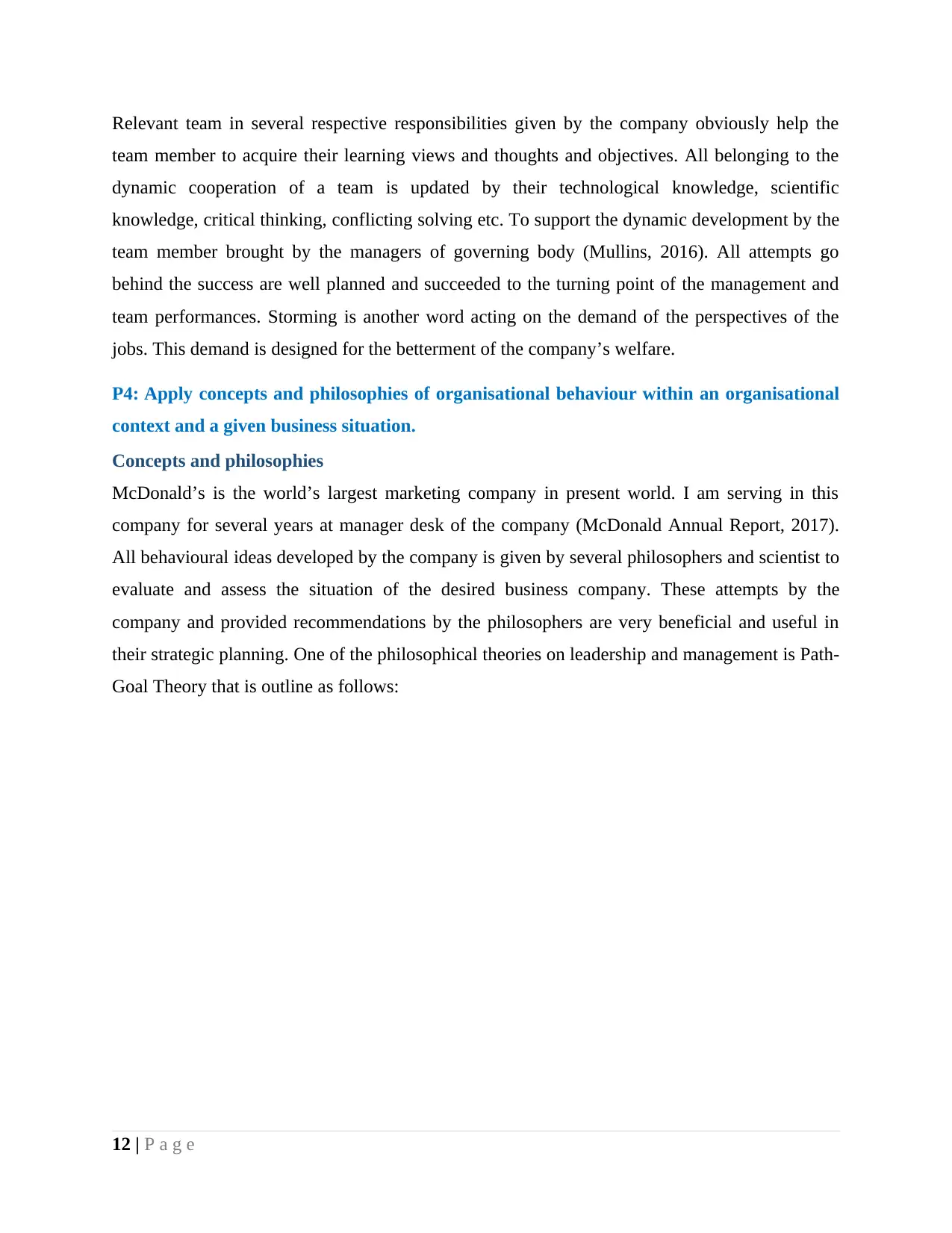
Relevant team in several respective responsibilities given by the company obviously help the
team member to acquire their learning views and thoughts and objectives. All belonging to the
dynamic cooperation of a team is updated by their technological knowledge, scientific
knowledge, critical thinking, conflicting solving etc. To support the dynamic development by the
team member brought by the managers of governing body (Mullins, 2016). All attempts go
behind the success are well planned and succeeded to the turning point of the management and
team performances. Storming is another word acting on the demand of the perspectives of the
jobs. This demand is designed for the betterment of the company’s welfare.
P4: Apply concepts and philosophies of organisational behaviour within an organisational
context and a given business situation.
Concepts and philosophies
McDonald’s is the world’s largest marketing company in present world. I am serving in this
company for several years at manager desk of the company (McDonald Annual Report, 2017).
All behavioural ideas developed by the company is given by several philosophers and scientist to
evaluate and assess the situation of the desired business company. These attempts by the
company and provided recommendations by the philosophers are very beneficial and useful in
their strategic planning. One of the philosophical theories on leadership and management is Path-
Goal Theory that is outline as follows:
12 | P a g e
team member to acquire their learning views and thoughts and objectives. All belonging to the
dynamic cooperation of a team is updated by their technological knowledge, scientific
knowledge, critical thinking, conflicting solving etc. To support the dynamic development by the
team member brought by the managers of governing body (Mullins, 2016). All attempts go
behind the success are well planned and succeeded to the turning point of the management and
team performances. Storming is another word acting on the demand of the perspectives of the
jobs. This demand is designed for the betterment of the company’s welfare.
P4: Apply concepts and philosophies of organisational behaviour within an organisational
context and a given business situation.
Concepts and philosophies
McDonald’s is the world’s largest marketing company in present world. I am serving in this
company for several years at manager desk of the company (McDonald Annual Report, 2017).
All behavioural ideas developed by the company is given by several philosophers and scientist to
evaluate and assess the situation of the desired business company. These attempts by the
company and provided recommendations by the philosophers are very beneficial and useful in
their strategic planning. One of the philosophical theories on leadership and management is Path-
Goal Theory that is outline as follows:
12 | P a g e
⊘ This is a preview!⊘
Do you want full access?
Subscribe today to unlock all pages.

Trusted by 1+ million students worldwide
1 out of 17
Related Documents
Your All-in-One AI-Powered Toolkit for Academic Success.
+13062052269
info@desklib.com
Available 24*7 on WhatsApp / Email
![[object Object]](/_next/static/media/star-bottom.7253800d.svg)
Unlock your academic potential
Copyright © 2020–2026 A2Z Services. All Rights Reserved. Developed and managed by ZUCOL.



